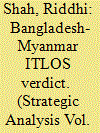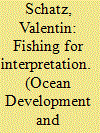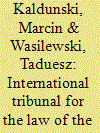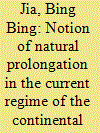| Srl | Item |
| 1 |
ID:
118138


|
|
|
|
|
| Publication |
2013.
|
| Summary/Abstract |
The International Tribunal for the Law of the Sea (ITLOS) is a body set up under the United Nations Convention on the Law of the Sea (UNCLOS) to deal with disputes that emerge because of a difference in the interpretation and application of the convention. 1 Bangladesh has had an ongoing maritime boundary dispute with India and Myanmar since 1974. On 14 March 2012, the ITLOS delivered a verdict and ended the long-running maritime boundary dispute between Bangladesh and Myanmar.
In the current global world, energy resources are a crucial element for a nation's growth. India, Bangladesh and Myanmar are no different in this regard. India discovered 100 trillion cubic feet (tcf) of gas reserve in the Bay of Bengal (BoB) in 2005-2006. Soon after, Myanmar discovered seven tcf of gas reserves near the Rakhine coast. This discovery of colossal gas reserves sparked a claim-staking contest between the three countries in the BoB.
|
|
|
|
|
|
|
|
|
|
|
|
|
|
|
|
| 2 |
ID:
148805


|
|
|
|
|
| Summary/Abstract |
On 2 April 2015, the International Tribunal for the Law of the Sea (ITLOS) rendered its first full-bench Advisory Opinion. In its reply to the request of the West African Sub-Regional Fisheries Commission the ITLOS found that Arts. 62(4), 58(3), 192 of the United Nations Convention on the Law of the Sea contain obligations for a flag state to ensure that vessels flying its flag do not engage in illegal fishing in the exclusive economic zones of coastal states. The Advisory Opinion has widely been praised for bringing clarity to the inadequate international fisheries law regime. This article undertakes to analyze the ITLOS's interpretive approach, expose interpretive deficiencies, and offer possible explanations for some of the outcomes where the ITLOS itself did not do so.
|
|
|
|
|
|
|
|
|
|
|
|
|
|
|
|
| 3 |
ID:
122804


|
|
|
|
|
| Publication |
2012.
|
| Summary/Abstract |
This paper gives an overview of the activities of the International Tribunal for the Law of the Sea ("the Tribunal") in 2011. It provides information on organizational matters, the jurisdiction of the Tribunal and cases before it.
|
|
|
|
|
|
|
|
|
|
|
|
|
|
|
|
| 4 |
ID:
131368


|
|
|
|
|
| Publication |
2014.
|
| Summary/Abstract |
This article considers the law of maritime delimitation as applied by the International Tribunal for the Law of the Sea in the 2012 Bangladesh v. Myanmar case. The dispute concerned the delimitation of the maritime boundary between the two states in the northern part of the Bay of Bengal. The decision demands a particular examination since it was the first delimitation dispute decided by the Tribunal. The article traces how the ITLOS applied and developed the methodology of maritime delimitation. It also analyzes the ascertainment of a true nature of international instruments as well as unilateral acts of states before international courts and tribunals.
|
|
|
|
|
|
|
|
|
|
|
|
|
|
|
|
| 5 |
ID:
120611


|
|
|
|
|
| Publication |
2013.
|
| Summary/Abstract |
The juridical continental shelf (CS), in terms of Article 76(1) of the United Nations Convention on the Law of the Sea (the LOS Convention), relies for its existence on the presence of a continental margin, which in turn depends on the existence of a natural prolongation. This is the principle expounded by this article, in the light of the provisions of Article 76(1) and (3) of the LOS Convention and other types of evidence of State practice. The prolongation, being geological in nature, is a necessary element underlying any claim to a juridical CS. Thus, in litigations, evidence must be led of its existence in support of such a claim. Even if the degree of influence exerted by the doctrine of natural prolongation upon the entitlement to the juridical CS and the delimitation of that entitlement between opposite or adjacent States are yet to be made clear in practice, the doctrine still has a separate life, of increasing importance, in today's legal regime of the CS. This is said in spite of the International Court of Justice (ICJ) judgment in Libya/Malta that emphasizes the distance criterion in respect of the continental shelf within 200 nm. The International Tribunal for the Law of the Sea (ITLOS) judgment in the recent Bangladesh/Myanmar delimitation case has provided an interesting interpretation of the notion of natural prolongation, and implicitly confirmed the relevance of the notion to the entitlement to the continental shelf in question. The case law in this regard has been significant, but other categories of State practice are also evolving that may underlie a new trend of giving the notion of natural prolongation a renewed, prominent place in this field.
|
|
|
|
|
|
|
|
|
|
|
|
|
|
|
|